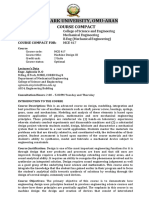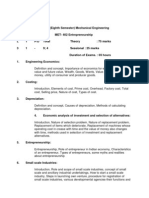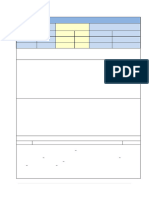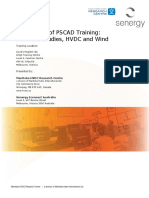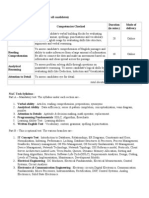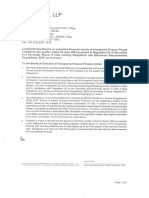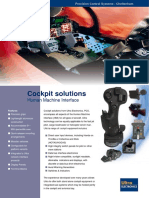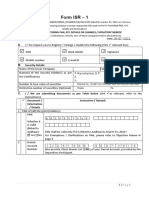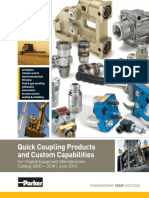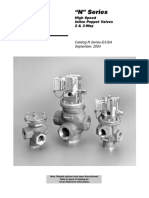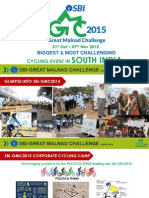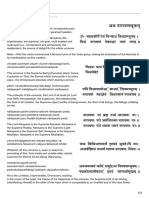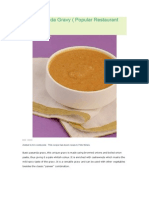M S Ramaiah School of Advanced Studies
M S Ramaiah School of Advanced Studies
Uploaded by
RavishankarCopyright:
Available Formats
M S Ramaiah School of Advanced Studies
M S Ramaiah School of Advanced Studies
Uploaded by
RavishankarCopyright
Available Formats
Share this document
Did you find this document useful?
Is this content inappropriate?
Copyright:
Available Formats
M S Ramaiah School of Advanced Studies
M S Ramaiah School of Advanced Studies
Uploaded by
RavishankarCopyright:
Available Formats
03/11/13 6:19 pm M S Ramaiah School of Advanced Studies
Page 1 of 5 http://www.msrsas.org/training/prociency.php
Module 1 : Aircraft Performance, Stability and Control
Indicative Content :
Introduction, Standard Atmosphere, Basic Aerodynamic Concepts (Airfoil Theory, Wing Theory, Aircraft Drag)
Aircraft Propulsion (Thrust, Power and SFC, Turboprop Engines, Turbofan Engines)
Level flight : Governing equations, ceiling conditions , Best (maximum) range with and without a specified airspeed.
Accelerated flight : Takeoff and landing, Steepest and fastest climb, Climbing and unpowered (gliding) flight, Most economical climb,
Cruise-climb and stepped-altitude flight, Maximum endurance
Turning flight: Turning flight in general, Maximum load factor and bank angle, Fastest and tightest turn, V-n Diagram)
Stability and control: Static equilibrium and Trim, wing location, tail plane sizing, CG travel
Flight Dynamics : Equations of motion and solution techniques
Longitudinal & Lateral Dynamics
Manoeuvrability : Stability derivatives, pitch-up, yaw divergence
By: Dr. H.K Narahari, Professor & Head - Dept. of AAE, MSRSAS
Start Date: 9th November 2013 End Date: 30th November 2013
Days & Timings:
Theory Session: Saturday 2.00 pm - 5.30 pm & Sunday 10.00 am - 2.00 pm
Laboratory Demos: Sunday 2.30 Pm - 5.30 Pm
Module 2: Structures, Safety and Impacts
Indicative Content :
Introduction to Automotive Structures - Sources of loads, Types of loads, Characteristics of loads and resulting failure modes,
Quantification of loads and its problems, Typical body constructions used and their merits and demerits
!"#$%&%'(&) &#+",'
Proficiency programme is a month long course offered on weekends for the benefit of working professionals & students. This provides an
opportunity for the students and working professionals to update their knowledge in modern and thrust areas.
The Modules offered during November 2013 are:
Mechanical Modules
Module 1: Aircraft Performance, Stability and Control
Module 2: Structures, Safety and Impact
Electronics Modules
Module 3: Automotive Control and Hardware In-Loop Simulation
Module 4: Mechanical Aspects of Electronic System Design
Module 5: Enterprise Computing
Manufacturing Modules
Module 6: Project Management
Module 7: Design of Machinery I
Contact and Fee Details
Who can register?
Students of Science, Engineering and Management
Teachers of Science and Engineering
Practicing Engineers and Managers
Certification
On successful completion of the course, MSRSAS awards a Certificate of Participation.
Last Date for Registration : 7th November 2013
Home Research Postgraduate Education Training & Lifelong Learning Engineering Solutions Technology Business
Training & LifeLong Learning > Proficiency Course
Training & Lifelong Learning
Advanced Certificate Training
Programme
Modular Training Programme
GET & PGET
Corporate Training Programme
Seminars / Workshops
Proficiency Course
03/11/13 6:19 pm M S Ramaiah School of Advanced Studies
Page 2 of 5 http://www.msrsas.org/training/prociency.php
Design of Automotive Body Structures - Analysis of load flow through the structure, Simple Structural Surfaces, Component sizing for
different types of loads and expected failure modes, Use of simplified analysis models, even for complex loads, in the initial design stage
Crash and Collision - Physics of collision, Types of collision, Automotive collision, Structural and occupant/pedestrian response to
crash, Key parameters for design for crash
Design for Safety - Crashworthiness, Effect of impact forces on humans, Designing for human safety, Safety systems, Structural design
considerations for occupant and pedestrian safety, Safety Standards and legislations
Crash Simulation - Tools for simulation of crash phenomena, Non-linear transient dynamic simulation for structural assessment (LS-
Dyna), Multibody dynamic simulation for occupant/pedestrian safety, Consideration of modeling of Physics, Pre-processing, Selection of
simulation parameters, Review and presentation of results and assessment of designs.
Demos On : LS-Dyna
By: Dr. V. K. Banthia., Professor - Dept. of AAE, MSRSAS
Start Date: 9th November 2013 End Date: 30th November 2013
Days & Timings:
Theory Session: Saturday 2.00 pm - 5.30 pm & Sunday 10.00 am - 2.00 pm
Laboratory Demos: Sunday 2.30 Pm - 5.30 Pm
Module 3: Automotive Control and Hardware In-Loop Simulation
Indicative Content :
Introduction: Model based system design, hardware in-the-loop simulation, need for HIL, continuous and discrete simulation basics,
modeling basics.
Connection Between Hardware and Simulation: Coupling concepts, simulator coupling and cosimulation, synchronization of co-
simulations, basic coupling principles, Event Discrete Simulation.
Real time workshop: Introduction to basic simulink blocks, xPC target, Real Time Workshop, State flow and Real Time Embedded
coder.
Model Building with Simulink: Controller programming using model based system design for an automotive application using simulink.
Plant Modelling: Plant modelling using simulink for the automotive application, PID controller design, analog output, targeting a
processor for plant.
Hardware implementation: Design of ECU for automotive applications, interfacing of sensors and actuators. System modelling and
validation using test setup. Interfacing of software models with hardware design. System programming and development of experimental
setup for hardware in loop simulation.
Hardware in-the-Loop: Testing of plant separately, testing of controller separately, and testing of plant and controller in the loop.System
Verification and Validation: Comparing the HIL test results with real world result
Hardware in-the-Loop testing: Experimental setup for HIL, HIL testing using dSPACE micro autobox, introduction to carmaker, building
scenarios and vehicle analysis using carmaker, interfacing dSPACE with carmaker and case studies on micro autobox
Case studies: Automated mirror control unit, ABS unit, head lamp control unit, hybrid system for two wheelers, battery management
system.
Demos On : Simulink
By : Dr. K. V. Narayana Swamy, Professor - Dept. of EEE / Mr.Nagananda, Asst. Professor - Dept. of EEE, MSRSAS
Start Date: 9th November 2013 End Date: 30th November 2013
Days & Timings:
Theory Session: Saturday 2.00 pm - 5.30 pm & Sunday 10.00 am - 2.00 pm
Laboratory Demos: Sunday 2.30 Pm - 5.30 Pm
Module 4 : Mechanical Aspects of Electronic System Design
Indicative Content :
Research Techniques: Literature survey, Ethnography research, Case Study research, Observatory and Participatory research:
Questionnaire survey for quantitative data collection: Types of quantitative data, various techniques to collect quantitative data,
design of questionnaire, formal and informal interview.
Quality Function Deployment, Future needs projection, requirement tree, objective tree, Design brief/ Product design specification:
Identifying customer voice and converting to technical voice, case studies to understand QFD, PDS/ Design Brief.
Ergonomics: Introduction and application of ergonomics; Display design, control design, panel lay out and control, anthropometry and
work station; Ergonomics application case study; Climatic factors; Noise and vibration; Lighting system; Work organization; Application of
ergonomics to small and medium industry.
Electronic Systems: Introduction to electronics systems design, Functions involved in mechanical design of electronic systems,
Mechanical development of electronic systems, Mechanical design aspects of packaging, Business aspects.
Packaging: First level packaging the chip carrier, Second level packaging: substrates and printed circuit boards, Electronics
manufacturing: chip carrier to substrate, Third level packaging: connectors,cables, modules, card cages and cabinets, Circuit card
connectors, Back panels, wire wrap board and cable connectors, Power supplies and buss bars, Card racks, Electronic
enclosures, Wires and cabling, Fans, Cold plates and cold rails.
Protection circuits: Overcurrent and over voltage protection, Electromagnetic compatibility, Regulations and standards, Technical
documentation.
Thermal analysis methods: Conduction, Radiation and convection, Stress and failure analysis of mechanical components, Thermo-
03/11/13 6:19 pm M S Ramaiah School of Advanced Studies
Page 3 of 5 http://www.msrsas.org/training/prociency.php
Thermal analysis methods: Conduction, Radiation and convection, Stress and failure analysis of mechanical components, Thermo-
mechanical analysis, Thermal design of electronic equipments, Power dissipation in electronic equipments, Fluid dynamics of electronic
circuits, Fluid statics, Fluid dynamics, Incompressible ideal fluid flow.
Heat transfer: natural and forced convection, heatsink design, Heat transfer in electronic equipments, Fluid properties, Forced
convection.
Vibration and shock: Analysis of vibration of electronic equipment, Reliability, Life-cycle and Reliability.
Quality Engineering: Product and performance measurement; Review in product design aspects; Critical parameter; Critical parameter
case discussion; Quality Dimension; Failure Tree
Analysis(FTA); Failure Mode Effect Analysis (FMEA); Product evaluation case study.
Demos On : MATLAB/Simulink, HPSICE, PSPICE, Lab VIEW, PSOC, HyperLynx Thermal. .
By: Mr. Ugra Mohan Roy, Asst. Professor - Dept. of EEE, MSRSAS
Start Date: 9th November 2013 End Date: 30th November 2013
Days & Timings:
Theory Session: Saturday 2.00 pm - 5.30 pm & Sunday 10.00 am - 2.00 pm
Laboratory Demos: Sunday 2.30 Pm - 5.30 Pm
Module 5: Enterprise Computing
Indicative Content :
Introduction: The enterprise, Paradigm shift in business model - from providing solutions to value added end-to-end solutions, From
client-server to enterprise computing, Architecture, design and coding for enterprise computing, Zackman framework
Business Process Modelling (BPM): Business processes and Business process modelling, Business Process Modelling Notation
(BPMN), Workflows
Review of Distributed systems: Issues in distributed computing, Homo-heterogeneous systems, Integration of legacy systems,
Middleware - Application servers and containers, Asynchronous communication mechanism - Message-oriented middleware and
message brokers
Web Technology for Enterprise Computing: Data modelling and XML schema, XML databases, XQuery, Data transformations using
XSLT, Validations, Personalisation (Internationalisation (ILN8) & Localisation (LN8)), Solution platforms -JEE and .Net
Service Oriented Architecture (SOA) and Service Oriented Computing (SOC): SOA, Web Services, WS standards, Coupling &
cohesion, Service discovery, Service coordination, Service composition, Service orchestration, SOAP and ReST-ful Web Services, JEE
Web Service development using Spring/Struts and Hibernate
Enterprise Integration: Patterns and frameworks for enterprise integration: MVC Spring/Struts, PAC, Broker Pattern - SOA, Layered -
JVM, Pipes and Filters - handlers
Distributed Computing for the Enterprise: Centrality of distributed computing in enterprise computing, Distributed Databases -
Efficiency, Integrity, Concurrency, Persistence and Maintainability, Transactional Data Bases- ACID, Transaction processing models,
Commit protocols, Optimised nested transactions, ORM, Interoperability & communication - RPC and RMI-IIOP environments
Introduction: The enterprise, Paradigm shift in business model - from providing solutions to value added end-to-end solutions, From
client-server to enterprise computing, Architecture, design and coding for enterprise computing, Zackman framework
Business Process Modelling (BPM): Business processes and Business process modelling, Business Process Modelling Notation
(BPMN), Workflows
Review of Distributed systems: Issues in distributed computing, Homo-heterogeneous systems, Integration of legacy systems,
Middleware - Application servers and containers, Asynchronous communication mechanism - Message-oriented middleware and
message brokers
Web Technology for Enterprise Computing: Data modelling and XML schema, XML databases, XQuery, Data transformations using
XSLT, Validations, Personalisation (Internationalisation (ILN8) & Localisation (LN8)), Solution platforms -JEE and .Net
Introduction: The enterprise, Paradigm shift in business model - from providing solutions to value added end-to-end solutions, From
client-server to enterprise computing, Architecture, design and coding for enterprise computing, Zackman framework
Business Process Modelling (BPM): Business processes and Business process modelling, Business Process Modelling Notation
(BPMN), Workflows
Review of Distributed systems: Issues in distributed computing, Homo-heterogeneous systems, Integration of legacy systems,
Middleware - Application servers and containers, Asynchronous communication mechanism - Message-oriented middleware and
message brokers
Web Technology for Enterprise Computing: Data modelling and XML schema, XML databases, XQuery, Data transformations using
XSLT, Validations, Personalisation (Internationalisation (ILN8) & Localisation (LN8)), Solution platforms -JEE and .Net
Service Oriented Architecture (SOA) and Service Oriented Computing (SOC): SOA, Web Services, WS standards, Coupling &
cohesion, Service discovery, Service coordination, Service composition, Service orchestration, SOAP and ReST-ful Web Services, JEE
Web Service development using Spring/Struts and Hibernate
Enterprise Integration: Patterns and frameworks for enterprise integration: MVC Spring/Struts, PAC, Broker Pattern - SOA, Layered -
JVM, Pipes and Filters - handlers
Distributed Computing for the Enterprise: Centrality of distributed computing in enterprise computing, Distributed Databases -
Efficiency, Integrity, Concurrency, Persistence and Maintainability, Transactional Data Bases- ACID, Transaction processing models,
Commit protocols, Optimised nested transactions, ORM, Interoperability & communication - RPC and RMI-IIOP environments
Security Services: Security goals, Vulnerabilities, Principles of security architecture - Privacy, Authentication, Authorisation,
Confidentiality, Integrity, Policy, Auditing, Proactive Risk Management, Availability, Compliance, Logging and Labelling, WS standards,
Solutions -Technology and security, Use of Cryptography, Symmetric & Asymmetric keys, Digital certificates & signatures, RSA, SSL
QoS and Performance: Scalability - Vertical (by Clustering) and Horizontal (by Load-balancing), Caching, Portability, Availability, Audit,
Logging and Performance
03/11/13 6:19 pm M S Ramaiah School of Advanced Studies
Page 4 of 5 http://www.msrsas.org/training/prociency.php
Logging and Performance
Special Enterprise Computing Systems: Peer-to-peer systems, Cloud computing, Grid computing
Demos On: Java EE platform, Glassfish application server
By : Mrs. Ami Rai E., Asst. Professor- Dept.of CE, MSRSAS
Start Date: 9th November 2013 End Date: 30th November 2013
Days & Timings:
Theory Session: Saturday 2.00 pm - 5.30 pm & Sunday 10.00 am - 2.00 pm
Laboratory Demos: Sunday 2.30 Pm - 5.30 Pm
Module 6: Project Managements
Indicative Content :
Introduction to Project Management: Strategic fit between projects and Corporate strategy, Projects as growth agent, Strategic and
Tactical projects
Special Organisation needs for Projects: Matrix type of organization for projects, Team building, Team leader, Belbin characteristics,
Change Management
Basic Networks: AOA/ AON; Precedence types (FS, FF, SF, SS), Mandatory and discretionary precedence, Complex Networks, PERT
charts; Forward and Backward Passes, Floats, Critical Paths
Project Planning: Scope change control, Project life cycles and distortions thereof, Resource planning; Resource levelling; Resource
constrained planning, Project Control, Crashing rules thereof;
Project Estimating and Budgeting: Project Budgetary Control, BCWS, BCWS, ACWP, Variance analysis
Financial and Non-financial Project Appraisal: PBP, ARR, NPV, IRR, Weighted Factor Scoring Model, Sensitivity and Risk Analysis,
Decision tree, Monte Carlo simulation
Project Contract Process: Legal Contracts for Projects
Other topics in Project Management: Traditional project management, Adaptive framework, Extreme project management (TPM/ APF/
XPM), Project reports, Project closure, Post Completion Audit (efficiency and propriety audits), Software project.
Demos On: Microsoft Project
By: Mr. Arup Bhattacharya, Manager - HR, Planning and PR, MSRSAS
Start Date: 9th November 2013 End Date: 30th November 2013
Days & Timings:
Theory Session: Saturday 2.00 pm - 5.30 pm & Sunday 10.00 am - 2.00 pm
Laboratory Demos: Sunday 2.30 Pm - 5.30 Pm
Module 7: Design of Machinery I
Indicative Content :
Review of general purpose machines, construction machineries, farm machineries and industrial machines
Study of operational requirements and conceptual design of the selected machine
Operational requirements of the selected machine and analysis of various loads acting on the machine
Exploding the selected machine, designing and geometric modelling of various structural components
Engineering analysis and optimisation of modelled structural components A case study approach will be followed in understanding
design philosophy and design process of existing machines like construction machineries, farm machineries, material handling
equipments, and special purpose machineries on the above aspects.
Demos On: Del, IC soft
By: Mr. Balappa.B.U/ Mr. Anil Kumar S, Asst. Professors - Dept. of MME, MSRSAS
Start Date: 9th November 2013 End Date: 30th November 2013
Days & Timings:
Theory Session: Saturday 2.00 pm - 5.30 pm & Sunday 10.00 am - 2.00 pm
Laboratory Demos: Sunday 2.30 Pm - 5.30 Pm
Theory Rs. 5,000/-
Theory and Laboratory Rs. 10,000/-
Payable as a single installment.
Contact and Fee Details:
Course Fee:
You can pay the Course Fee by Cash on the course joining day or enroll yourself by sending a Cheque/DD in advance in favour of
03/11/13 6:19 pm M S Ramaiah School of Advanced Studies
Page 5 of 5 http://www.msrsas.org/training/prociency.php
You can pay the Course Fee by Cash on the course joining day or enroll yourself by sending a Cheque/DD in advance in favour of
M. S. Ramaiah School of Advanced Studies, Bangalore.
Kindly bring two passport/stamp size photos for registration purpose.
For further enquiries or clarifications, please contact
Ms. Roopa
Asst. Executive - Academic Relations
E-Mail: roopa@msrsas.org
Mobile: 96630 63832
Mr. Ashwin T. A.
Executive - Education Relations
E-Mail: ashwin_ta@msrsas.org, ashwin.msrsas@gmail.com
Mobile: 96868 37885
Phone: 91 80 4906 5555 Extn: 2111, Fax: 91 80 - 4211 1205
Note: If you are unable to attend the course due to time constraints then the same course can be conducted as a corporate training
programme provided the participants strength is 15 or above. So please feel free to contact us for any other information.
Sports Club
Gymnasium
Yoga Club
Aero Modeling and Flying Club
RC-Car Model Building and Racing
SASTRONICS Hobby Club
Film Club
Music Club
SAE Student Chapter
Design Forum
Management Association
Doctoral Programme
PG (Engg) Full Time
PG (Engg) Part Time
MBA Full Time
MBA Part Time
Training
Application Forms
Templates
M.S. Ramaiah School
of Advanced Studies
#470-P, Peenya Industrial Area
Peenya 4th Phase, Bengaluru
Karnataka, India 560 058
Tel: +91 80 4906 5555
Fax : +91 80 4211 1205
Email : info@msrsas.org
Home Welcome About Us Contact Us Site Map
Copyright 2010-2011 MSRSAS. All Rights Reserved. Design and Developed by Tao Infotech Best to be viewed 1024 x 768 pixels
You might also like
- Indigenisation Procedure DDPMAS 2002 PDFNo ratings yetIndigenisation Procedure DDPMAS 2002 PDF149 pages
- University of Kerala: Syllabus For Vii SemesterNo ratings yetUniversity of Kerala: Syllabus For Vii Semester43 pages
- Present Developments in Control Applications: K. J. Åström Lund University SwedenNo ratings yetPresent Developments in Control Applications: K. J. Åström Lund University Sweden56 pages
- Module Information Module Title Electric Drives and Control Module Code MMD2511No ratings yetModule Information Module Title Electric Drives and Control Module Code MMD25114 pages
- ME Electrical Power Electronics and DrivesNo ratings yetME Electrical Power Electronics and Drives48 pages
- Scheme I To IV Sems - & Syllabus For M - Tech - I & II Sems - (Manufacturing Technology) W - e - F 2013-14No ratings yetScheme I To IV Sems - & Syllabus For M - Tech - I & II Sems - (Manufacturing Technology) W - e - F 2013-1418 pages
- 7th 8th Syll With Objectivesa21.11.09acmNo ratings yet7th 8th Syll With Objectivesa21.11.09acm36 pages
- Teaching Model-Based Design and Rapid Prototyping To Undergraduate StudentsNo ratings yetTeaching Model-Based Design and Rapid Prototyping To Undergraduate Students6 pages
- Third Year Second Semester: Department of Mechanical Engineering - Course CatalogueNo ratings yetThird Year Second Semester: Department of Mechanical Engineering - Course Catalogue8 pages
- KU Electrical Engineering 5th Semester GuideNo ratings yetKU Electrical Engineering 5th Semester Guide37 pages
- Btech Viii Sem Syallbus 21-22030622124052No ratings yetBtech Viii Sem Syallbus 21-2203062212405216 pages
- Monograph Parametric Modeling - OS KroolNo ratings yetMonograph Parametric Modeling - OS Krool113 pages
- Training Outline - Senergy Australia - Applications of PSCAD - Transient Studies HVDC and Wind - 4 Day PDFNo ratings yetTraining Outline - Senergy Australia - Applications of PSCAD - Transient Studies HVDC and Wind - 4 Day PDF3 pages
- Autotronics and Vehicle Intelligent Course Outline 2022No ratings yetAutotronics and Vehicle Intelligent Course Outline 20222 pages
- Fourth KAS CRSL Research Conference "Innovative Research and Creativity at AUB"No ratings yetFourth KAS CRSL Research Conference "Innovative Research and Creativity at AUB"43 pages
- (B.E. Production Engineering Sem - VII & VIII) : Revised Syllabus ofNo ratings yet(B.E. Production Engineering Sem - VII & VIII) : Revised Syllabus of41 pages
- Design of Electrical Power Supply System in An Oil and Gas RefineryNo ratings yetDesign of Electrical Power Supply System in An Oil and Gas Refinery70 pages
- Engineering Management Program: General InformationNo ratings yetEngineering Management Program: General Information7 pages
- Engineering Services Examination 2020 Important DatesNo ratings yetEngineering Services Examination 2020 Important Dates3 pages
- Building Software for Simulation: Theory and Algorithms, with Applications in C++From EverandBuilding Software for Simulation: Theory and Algorithms, with Applications in C++No ratings yet
- Engineering Principles of Combat Modeling and Distributed SimulationFrom EverandEngineering Principles of Combat Modeling and Distributed SimulationNo ratings yet
- Rapid Prototyping Software for Avionics Systems: Model-oriented Approaches for Complex Systems CertificationFrom EverandRapid Prototyping Software for Avionics Systems: Model-oriented Approaches for Complex Systems CertificationNo ratings yet
- Current Controlled Hysteresis Brakes: Transmitting Torque Through AirNo ratings yetCurrent Controlled Hysteresis Brakes: Transmitting Torque Through Air7 pages
- DS200-14C - Model 47TC100 Thermocoupler SensorNo ratings yetDS200-14C - Model 47TC100 Thermocoupler Sensor2 pages
- Highly Reliable Hysteresis Devices For Tension and Torque ControlNo ratings yetHighly Reliable Hysteresis Devices For Tension and Torque Control6 pages
- Parker Quick Coupling Products Complete CatalogNo ratings yetParker Quick Coupling Products Complete Catalog64 pages
- The GE F404 - Engine of The RAAFs New FighterNo ratings yetThe GE F404 - Engine of The RAAFs New Fighter58 pages
- A Software Assurance Framework For AircraftNo ratings yetA Software Assurance Framework For Aircraft119 pages
- Combination Probes For Stagnation Pressure and TemperatureNo ratings yetCombination Probes For Stagnation Pressure and Temperature12 pages
- MoF O.M. Dated 13.07.2017-Travelling Allowance Rules - Implementation of The Seventh Central Pay Commission50% (2)MoF O.M. Dated 13.07.2017-Travelling Allowance Rules - Implementation of The Seventh Central Pay Commission6 pages
- Daily Invocations by Swami Krishnananda: The Sri SuktaNo ratings yetDaily Invocations by Swami Krishnananda: The Sri Sukta3 pages
- Biggest & Most Challenging: Cycling Event inNo ratings yetBiggest & Most Challenging: Cycling Event in8 pages
- Basic Pasanda Gravy (Popular Restaurant Recipes) : Tarla DalalNo ratings yetBasic Pasanda Gravy (Popular Restaurant Recipes) : Tarla Dalal17 pages
- NPS Transaction Statement For Tier I Account: Current Scheme PreferenceNo ratings yetNPS Transaction Statement For Tier I Account: Current Scheme Preference4 pages
- Instant Access to Oxford Guide to Plain English 5th Edition Cutts ebook Full Chapters100% (1)Instant Access to Oxford Guide to Plain English 5th Edition Cutts ebook Full Chapters56 pages
- Nysdot Bridge Inspection Manual 2014 PDFNo ratings yetNysdot Bridge Inspection Manual 2014 PDF416 pages
- Rinnai Owners Manual R98LSi Tankless Water HeaterNo ratings yetRinnai Owners Manual R98LSi Tankless Water Heater72 pages
- Project 1 Personal Prescription Paper Final Submission 1No ratings yetProject 1 Personal Prescription Paper Final Submission 15 pages
- Department of Electrical Engineering EE241L: Electrical Network AnalysisNo ratings yetDepartment of Electrical Engineering EE241L: Electrical Network Analysis11 pages
- The Occult Underground The Owbn Guide To Sabbat Thaumaturgy October 2010No ratings yetThe Occult Underground The Owbn Guide To Sabbat Thaumaturgy October 201014 pages
- Strategies of Justification in Authoritarian IdeologyNo ratings yetStrategies of Justification in Authoritarian Ideology24 pages
- Present Developments in Control Applications: K. J. Åström Lund University SwedenPresent Developments in Control Applications: K. J. Åström Lund University Sweden
- Module Information Module Title Electric Drives and Control Module Code MMD2511Module Information Module Title Electric Drives and Control Module Code MMD2511
- Scheme I To IV Sems - & Syllabus For M - Tech - I & II Sems - (Manufacturing Technology) W - e - F 2013-14Scheme I To IV Sems - & Syllabus For M - Tech - I & II Sems - (Manufacturing Technology) W - e - F 2013-14
- Teaching Model-Based Design and Rapid Prototyping To Undergraduate StudentsTeaching Model-Based Design and Rapid Prototyping To Undergraduate Students
- Third Year Second Semester: Department of Mechanical Engineering - Course CatalogueThird Year Second Semester: Department of Mechanical Engineering - Course Catalogue
- Training Outline - Senergy Australia - Applications of PSCAD - Transient Studies HVDC and Wind - 4 Day PDFTraining Outline - Senergy Australia - Applications of PSCAD - Transient Studies HVDC and Wind - 4 Day PDF
- Autotronics and Vehicle Intelligent Course Outline 2022Autotronics and Vehicle Intelligent Course Outline 2022
- Fourth KAS CRSL Research Conference "Innovative Research and Creativity at AUB"Fourth KAS CRSL Research Conference "Innovative Research and Creativity at AUB"
- (B.E. Production Engineering Sem - VII & VIII) : Revised Syllabus of(B.E. Production Engineering Sem - VII & VIII) : Revised Syllabus of
- Design of Electrical Power Supply System in An Oil and Gas RefineryDesign of Electrical Power Supply System in An Oil and Gas Refinery
- Engineering Management Program: General InformationEngineering Management Program: General Information
- Engineering Services Examination 2020 Important DatesEngineering Services Examination 2020 Important Dates
- Building Software for Simulation: Theory and Algorithms, with Applications in C++From EverandBuilding Software for Simulation: Theory and Algorithms, with Applications in C++
- Engineering Principles of Combat Modeling and Distributed SimulationFrom EverandEngineering Principles of Combat Modeling and Distributed Simulation
- Rapid Prototyping Software for Avionics Systems: Model-oriented Approaches for Complex Systems CertificationFrom EverandRapid Prototyping Software for Avionics Systems: Model-oriented Approaches for Complex Systems Certification
- Current Controlled Hysteresis Brakes: Transmitting Torque Through AirCurrent Controlled Hysteresis Brakes: Transmitting Torque Through Air
- Highly Reliable Hysteresis Devices For Tension and Torque ControlHighly Reliable Hysteresis Devices For Tension and Torque Control
- Combination Probes For Stagnation Pressure and TemperatureCombination Probes For Stagnation Pressure and Temperature
- MoF O.M. Dated 13.07.2017-Travelling Allowance Rules - Implementation of The Seventh Central Pay CommissionMoF O.M. Dated 13.07.2017-Travelling Allowance Rules - Implementation of The Seventh Central Pay Commission
- Daily Invocations by Swami Krishnananda: The Sri SuktaDaily Invocations by Swami Krishnananda: The Sri Sukta
- Basic Pasanda Gravy (Popular Restaurant Recipes) : Tarla DalalBasic Pasanda Gravy (Popular Restaurant Recipes) : Tarla Dalal
- NPS Transaction Statement For Tier I Account: Current Scheme PreferenceNPS Transaction Statement For Tier I Account: Current Scheme Preference
- Instant Access to Oxford Guide to Plain English 5th Edition Cutts ebook Full ChaptersInstant Access to Oxford Guide to Plain English 5th Edition Cutts ebook Full Chapters
- Project 1 Personal Prescription Paper Final Submission 1Project 1 Personal Prescription Paper Final Submission 1
- Department of Electrical Engineering EE241L: Electrical Network AnalysisDepartment of Electrical Engineering EE241L: Electrical Network Analysis
- The Occult Underground The Owbn Guide To Sabbat Thaumaturgy October 2010The Occult Underground The Owbn Guide To Sabbat Thaumaturgy October 2010
- Strategies of Justification in Authoritarian IdeologyStrategies of Justification in Authoritarian Ideology



